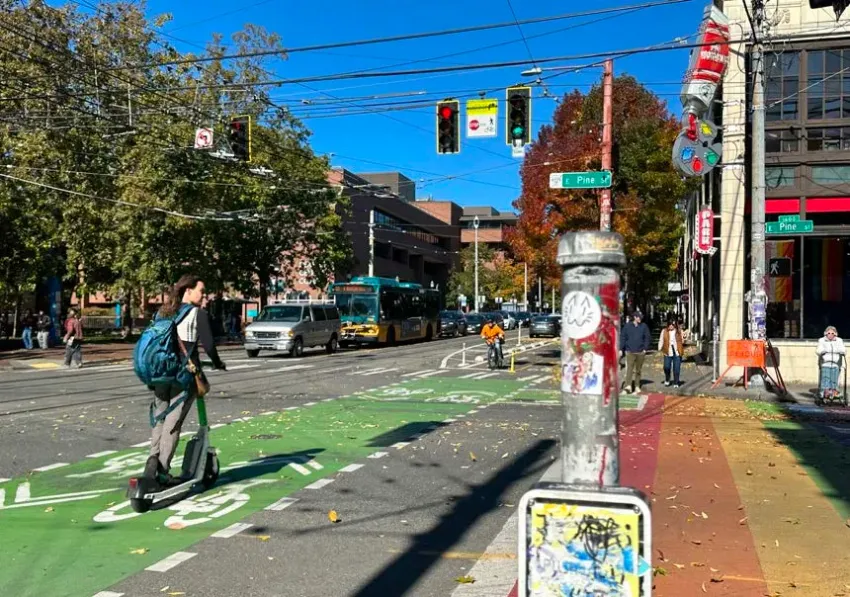As the number of Lime bikes and scooters grows, so do concerns about their speed and safety on Capitol Hill sidewalks, according to discussion at this month’s LGBTQ+ Advisory Council meeting with Seattle Department of Transportation representatives on Wednesday, October 8.
“We have been getting complaints for as long as we have had scooters,” said Becky Edmonds, SDOT’s shared mobility program manager.
Concerned residents attending the meeting recounted worries about their safety around Lime bikes and scooters in the neighborhood, including reckless driving and parking. Many live at Pride Place, an LGBTQIA+ senior housing community on Capitol Hill.
A common theme was the feeling that residents are unable to leave their front door without having to dodge speeding electric bikes and scooters. A few attendees came with their own research on solutions, including Seattle resident J. Steve Mayo, who said that technology is advanced enough to prevent pedestrian collisions. Lime debuted sidewalk detection in San José in 2020, but it has not been launched in Seattle.
“We have cars that can detect a pedestrian,” said Mayo.
During SDOT’s presentation, Edmonds shared initiatives in place to help increase public safety. The department is currently using what it calls a Safe System Approach — lowering speed limits, promoting safe driving, and fostering safe pedestrian practices — to reduce traffic deaths.
Edmonds added that last year Seattle had a total of 6.3 million trips on Lime bikes and scooters, but this year that number is already over 8 million. She also said that data show that many residents use Lime bikes and scooters as their sole mode of transportation. Seattle offers a reduced rate for low income citizens who qualify.
“I think we see a lot more popularity, but of course, a lot more of those ubiquitous issues and growing pains as we figure out how to build up that supportive infrastructure,” said Parker Dawson, Lime’s senior regional lead for government relations for the Pacific Northwest.
Edmonds said that this year more residents have spoken up about safety concerns, especially people riding recklessly. When SDOT expects bigger crowds during holidays or big events, it can set up “slow zones,” where bikes and scooters are forced to go slower.
Those attending the meeting raised the question of creating more “slow zones” in Seattle or having more regulations for riders of the electric devices. Because GPS isn't always accurate, setting up no-ride zones is trickier than it sounds and can lead to other safety problems, Dawson said. For example, if the system thinks someone is on the sidewalk when they’re really in the street, it could suddenly stop the Lime device, which can lead to serious injuries.
Councilmembers also discussed concerns that younger Lime riders were more likely to be riding recklessly. While gathering identification on specific riders who are breaking the law could be a solution, Dawson said that it would be problematic to do so in the current political climate.
Reporting reckless riders is possible using the “Find It, Fix It” app.
Support the Seattle Gay News: Celebrate 51 Years with Us!
As the third-oldest LGBTQIA+ newspaper in the United States, the Seattle Gay News (SGN) has been a vital independent source of news and entertainment for Seattle and the Pacific Northwest since 1974.
As we celebrate our 51st year, we need your support to continue our mission.
A monthly contribution will ensure that SGN remains a beacon of truth and a virtual gathering place for community dialogue.
Help us keep printing and providing a platform for LGBTQIA+ voices.
How you can donate!
Using this link: givebutter.com/6lZnDB
Text “SGN” to 53-555
Or Scan the QR code below!



